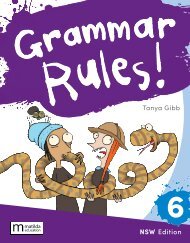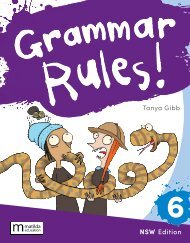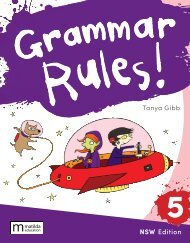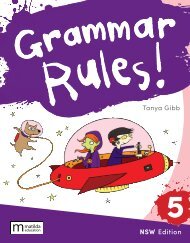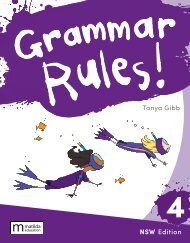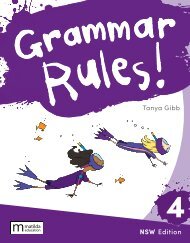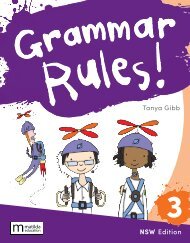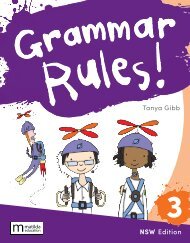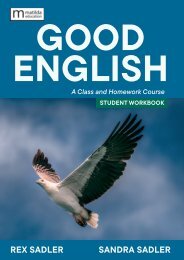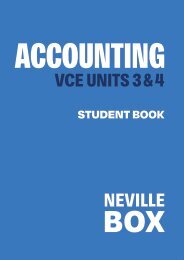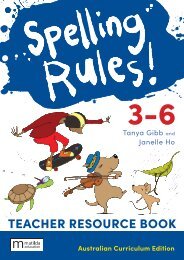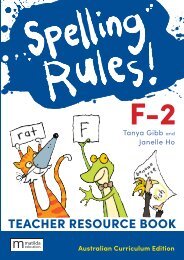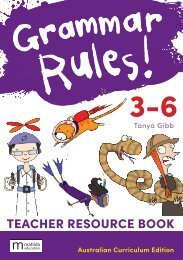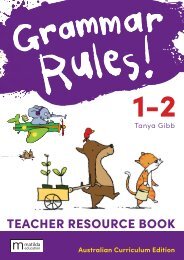Good Science Victorian Curriculum Year 7
Digital sample of Matilda's newest publication, Good Science Victorian Curriculum Year, authored by Emma Craven and Aaron Elias. For more information visit www.matildaeducation.com.au or email Katrina Tucker, katrinatucker@matildaed.com.au
Digital sample of Matilda's newest publication, Good Science Victorian Curriculum Year, authored by Emma Craven and Aaron Elias. For more information visit www.matildaeducation.com.au or email Katrina Tucker, katrinatucker@matildaed.com.au
You also want an ePaper? Increase the reach of your titles
YUMPU automatically turns print PDFs into web optimized ePapers that Google loves.
CHAPTER 1: SCIENCE SKILLS<br />
3<br />
The independent variable is the one thing you want to change in<br />
an investigation. If you change more than one thing, the investigation<br />
probably won’t be a fair test.<br />
Let’s say you decide to put three plants in three different amounts<br />
of sunlight to see which plant grows the most. You would make sure<br />
the plants were the same size, health and species, and only change<br />
the amount of sunlight the plant is getting – this is the independent<br />
variable. The dependent variable would be your measurement of<br />
the plants’ growth (which could be their weight or their size) and the<br />
controlled variables are all the other factors.<br />
What are the three types of scientific variable?<br />
A hypothesis is a prediction of the outcome<br />
A hypothesis is a prediction made to test something. A good hypothesis<br />
involves some reading and research so that scientists can make an<br />
informed decision about what they think will happen, before testing it in<br />
an investigation. A hypothesis can be supported (found to be correct) or<br />
rejected (found to be incorrect).<br />
You use the independent and dependent variables when writing<br />
a hypothesis, so the first step is always to identify these. The general rule<br />
to use when writing a hypothesis is:<br />
independent<br />
variable<br />
If I do this , then this will happen.<br />
dependent<br />
variable<br />
Even though this rule has the word ‘I’ in it, that’s not how you write the<br />
hypothesis! You should always write it formally and in the third person<br />
(don’t use I, we, you etc.).<br />
What is a hypothesis?<br />
Figure 1.9 These scientists<br />
are doing fieldwork to test<br />
water samples.<br />
ELEMENTS OF AN<br />
INVESTIGATION<br />
Think again about the<br />
investigation that involves<br />
plants in different amounts of<br />
sunlight to see which plant grows<br />
the most. The elements of this<br />
investigation are:<br />
• hypothesis: If a plant is placed<br />
in direct sunlight, then it will<br />
grow more than a plant in<br />
indirect or no light.<br />
• independent variable: amount<br />
of direct sunlight (one plant is<br />
put in a dark cupboard, one is<br />
put outside in direct sunlight<br />
and one is put near a window)<br />
• dependent variable: growth<br />
of the plant, in millimetres<br />
• controlled variables: species<br />
of plant, starting size of plant,<br />
health of plant, amount of<br />
water given to plant.<br />
TYPES OF<br />
INVESTIGATIONS<br />
Scientists do many different<br />
types of investigations,<br />
depending on their area of<br />
science and the information<br />
they need to gather.<br />
Fieldwork happens when<br />
information and data are<br />
collected outside of the<br />
laboratory or usual setting.<br />
Environmental scientists often<br />
do fieldwork, such as collecting<br />
water samples from streams<br />
to study the water quality or<br />
counting the numbers of species<br />
of plants and animals in an area.<br />
Experiments are usually<br />
carried out to test a hypothesis.<br />
Experiments in science include<br />
(among other things) those<br />
undertaken in chemistry, physics,<br />
earth science, and with living<br />
things in biology.<br />
Research informs a hypothesis<br />
before it is created. Scientists<br />
often share their research<br />
so they can build scientific<br />
understanding and discoveries<br />
over time.<br />
11




